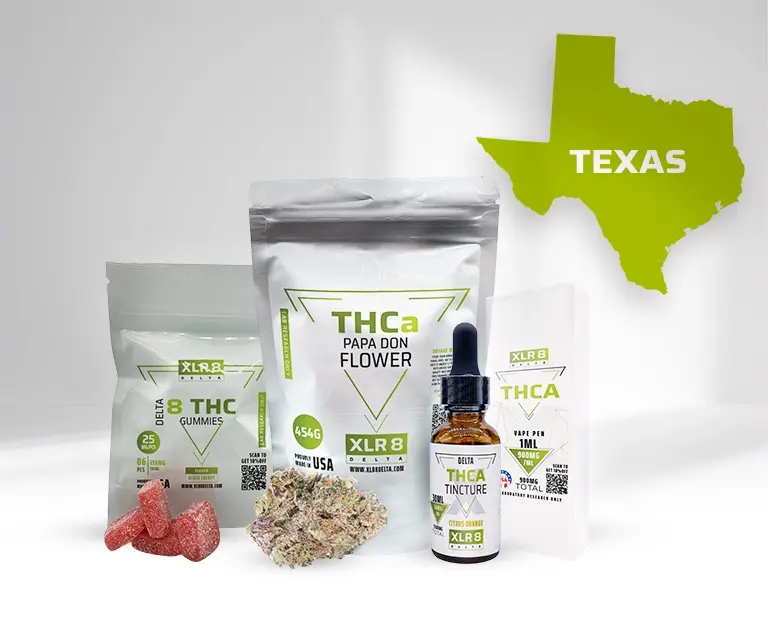As interest in cannabinoids expands across Texas, understanding the legal framework surrounding tetrahydrocannabinolic acid (THCA) is essential for consumers, retailers, and growers. Although THCA itself is non-psychoactive, it occupies a legally sensitive position due to its close relationship with THC, the psychoactive compound in cannabis. This guide provides a comprehensive analysis of THCA’s legality in Texas, its legal risks, and essential compliance measures for businesses and individuals.
What Is THCA and How Does It Relate to Texas Law?
THCA (tetrahydrocannabinolic acid) is the raw, non-intoxicating precursor to delta-9 THC, the primary psychoactive component of cannabis. When exposed to heat through smoking, vaping, or cooking, THCA converts into THC a process known as decarboxylation.
Under Texas law, the legal status of THCA hinges on two main factors:
- Whether it is derived from hemp or marijuana
- Whether it converts into delta-9 THC above the legal threshold
According to the Texas Health and Safety Code Chapter 443 and the 2018 federal Farm Bill, hemp-derived products are legal if they contain less than 0.3% delta-9 THC by dry weight. THCA content, while not psychoactive in its raw form, becomes problematic if it results in a product exceeding this threshold when decarboxylated.
Is THCA Legal in Texas?
THCA Legal in Texas — But With Crucial Conditions
Yes, THCA is legal in Texas only if the product it’s in does not exceed 0.3% delta-9 THC by dry weight even after decarboxylation. This means Texas authorities may consider the “total potential THC”, not just the delta-9 levels at the time of sale.
The ambiguity arises from how state agencies interpret THC levels. While federal law does not count THCA in its definition of illegal THC, Texas law enforcement may treat high-THCA hemp flower as marijuana if it can potentially produce psychoactive THC beyond the legal limit.
Retailers, growers, and consumers must be vigilant in how THCA is processed, marketed, and consumed within the state.
Legal Risks for High-THCA Hemp Products in Texas
Despite being technically hemp, high-THCA flower often visually and chemically resembles marijuana, creating enforcement risks. Law enforcement officers may seize products and arrest individuals based on:
- Field tests that detect THC without distinguishing between THCA and delta-9
- Assumptions about intent to decarboxylate the product
- Lab reports showing total THC (THCA + delta-9 THC) exceeding the legal threshold
Cases in Texas have shown that prosecutors often pursue charges based on total THC content, regardless of the compound’s raw form.
Retail and Compliance Guidelines for THCA Products in Texas
Ensure Accurate Lab Testing and COAs
Every THCA product sold in Texas should come with an up-to-date Certificate of Analysis (COA) from a DEA-registered lab. The COA should clearly specify:
- Delta-9 THC content by dry weight
- THCA percentage
- Total potential THC if decarboxylated
Use Correct Labeling Language
Avoid terms that suggest psychoactivity, such as “THC-rich,” “smokable,” or “potent.” Instead, emphasize that the product is raw, non-psychoactive hemp.
Avoid Marketing for Inhalation or Conversion
Products intended for smoking or cooking which naturally decarboxylate THCA are more likely to draw legal scrutiny. Instead, THCA should be sold as raw, unprocessed hemp.
Document Supply Chain Due Diligence
Retailers and wholesalers should keep clear records of:
- Grower licenses
- Batch harvest dates
- Lab test dates and results
- Storage and shipping conditions
Penalties for Non-Compliance with THCA Laws in Texas
If a THCA product is interpreted by authorities as marijuana due to its potential THC content, the consequences can be severe:
| Offense | Possession Amount | Penalty |
| Misdemeanor Possession | <2 oz | Up to 180 days jail + $2,000 fine |
| Felony Possession | >4 oz | 2-10 years prison + $10,000 fine |
| Felony Distribution or Sale | Any amount | 2-20 years prison |
| Manufacture or Cultivation | Any amount | Up to life in prison in major cases |
Recent Legal Developments Impacting THCA in Texas
- 2023: Several counties in Texas increased enforcement actions against hemp flower stores, especially those selling high-THCA products.
- 2024: Legal advocacy groups filed lawsuits challenging state interpretations that count THCA toward total THC, citing federal distinctions.
- 2025 Outlook: Proposed legislation may redefine THC thresholds by total THC, making THCA-rich products even more difficult to sell legally.
Key Takeaways for Staying Compliant
- THCA is conditionally legal in Texas if the product remains under 0.3% total delta-9 THC by dry weight.
- Texas law enforcement may consider THCA content when determining legality, especially if the product is smokable.
- Retailers must secure comprehensive lab testing, clear documentation, and conservative marketing to avoid liability.
- Consumers should purchase from vendors who can provide verified COAs and detailed product sourcing.
Final Thoughts: Navigating the Legal Grey Zone of THCA in Texas
While THCA remains legal in Texas under federal hemp law, it exists in a precarious legal grey area. Regulatory agencies and local law enforcement continue to scrutinize hemp-derived products with psychoactive potential. To operate safely in this landscape, businesses and consumers must emphasize rigorous compliance, transparent testing, and cautious marketing. Understanding the nuances of how THCA legal in Texas is interpreted at both the state and local level is essential. Until Texas legislation provides clearer definitions and enforcement standards, conservative compliance is the most reliable strategy for avoiding legal consequences.





